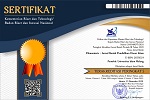IMPROVING NUMERACY SKILLS OF ELEMENTARY SCHOOL STUDENTS THROUGH PROBLEM-BASED LEARNING: AN IMPLEMENTATION OF LESSON STUDY
DOI:
https://doi.org/10.33474/elementeris.v4i1.14387Abstract
One of the basic literacy that can be applied in primary school education is numeracy literacy. The purpose of this study was to describe the increase in numeracy literacy skills of elementary school students at SD Bina Anak Sholeh (Islamic Fullday School) in Tuban through problem-based learning. This research was conducted in Class V-B for the academic year 2021/2020, which consisted of 27 students. Problem-based learning is carried out with a lesson study approach which includes three stages, namely plan (planning), do (implementation), and see (observation and reflection) for each cycle. The results showed that the problem-based learning model could be applied to improve the numeracy literacy skills of elementary school students. The ability of teachers to develop problem-based learning plans, present problems in the form of literacy, plan learning strategies and develop numeracy literacy assessment instruments. The numeracy literacy ability of elementary school students has increased.
References
Abidin, Yunus, Tita Mulyati, Hana Yunansah. 2017. Pembelajaran Literasi Strategi Meningkatkan Kemampuan Literasi Matematika, Sains, Membaca, dan Menulis. Jakarta : Bumi Aksara.
Andani, M., Pranata, O. H., & Hamdu, G. (2021). Systematic Literature Review: Model Problem Based Learning pada Pembelajaran Matematika Sekolah Dasar. PEDADIDAKTIKA: Jurnal Ilmiah Pendidikan Guru Sekolah Dasar, 8(2), 404-417.
Cahyanto, B., Maghfirah, M., & Hamidah, N. (2021). Implementasi Pembelajaran Daring di Masa Pandemi Covid-19. At-Thullab: Jurnal Pendidikan Guru Madrasah Ibtidaiyah, 5(1).
Dirjen Pendidikan Dasar dan Menengah. (2016). Menumbuhkan Budaya Literasi di Sekolah. Jakarta : Kementerian Pendidikan dan Kebudayaan.
Fadiana, M., & Andriani, A. (2021). Metacognition Profile of Vocational High School Students in Mathematics Problem Solving Based on Logical Thinking Skills. AL-ISHLAH: Jurnal Pendidikan, 13(2), 1027-1037.
Fadiana, M. (2016). Strategi Generalisasi Pola Siswa SMP Kelas VII. In Prosiding Seminar Nasional Matematika X Tahun.
Warli,W., & Fadiana, M. (2015). Math Learning Model that Accommodates Cognitive Style to Build Problem-Solving Skills. Higher Education Studies, 5(4), 86.
Frasandy, R. N., & Anggraini, S. (2021). Hubungan Penggunaan Media Nyata Dengan Kemampuan Berpikir Kritis. 3(November), 43–54.
Khotimah, R. P., & Masduki, M. (2016). Improving teaching quality and problem solving ability through contextual teaching and learning in differential equations: A lesson study approach. JRAMathEdu (Journal of Research and Advances in Mathematics Education), 1(1), 1-13.
Lewis, C. C. (2002). Lesson Study: A Handbook of Teacher-Led Instructional Change. Philadelphia, PA: Research for Better School, Inc.
Lewis, C. C., Perry, R. R., Hurd, J. (2009). Improving Mathematics Instruction Truogh Lesson Study: A Theoretical Model and North American Case. Journal of Mathematics Teacher Education, 12: 285-304.
Miles, B. M., Huberman, A. M. (1994), Qualitative Data Analysis. Second Edition. Publication: California, US.
Mulyana, Slamet. (2007). Lesson Study. Makalah. Kuningan: LPMP-Jawa Barat.
Novianti, D., & Sulistiani, I. R. (2020). Efektivitas Pembelajaran Kooperatif Tipe Pair And Check Dalam Pembelajaran Matematika. Elementeris: Jurnal Ilmiah Pendidikan Dasar Islam, 2(2), 1-13.
OECD. (2016). Results: Excellence and Equity in Education, PISA, OECD Publishing. (Volume I) http://dx.doi.org/10.1787/97892642664 90-en. (diakses 24 desember 2016).
Rusman. (2010). Model-Model Pembelajaran. Bandung: Rajawali Pers.
Rini, T. A., Akbar, S., Maningtyas, R. D. T., & Cahyanto, B. (2020). The Effectiveness of E-Module through Metacognitive Construction in Blended Learning System. Proceedings - 2020 6th International Conference on Education and Technology, ICET 2020, 1–6. https://doi.org/10.1109/ICET51153.2020.9276588
Rismawati, B. V., Arif, M., & Mahfud, M. (2021). Strategi Madrasah Ibtidaiyah Dalam Meningkatkan Profesionalisme Guru Kelas Di Era Revolusi Industri 4.0. Elementeris : Jurnal Ilmiah Pendidikan Dasar Islam, 3(1), 59. https://doi.org/10.33474/elementeris.v3i1.10538
Sari, R. H. N. (2015). Literasi Matematika: Apa, Mengapa dan Bagaimana. Seminar Nasional matematika dan pendidikan matematika UNY (Vol. 8). Yogyakarta: Universitas Negeri Yogyakarta.
Siswantoro, E., & Suwito, A. (2021). Development of Pised Media Based on Realistic Mathematics Education in Elementary School. Elementeris : Jurnal Ilmiah Pendidikan Dasar Islam, 3(2), 55. https://doi.org/10.33474/elementeris. v3i2.11151
Smith, C., & Cekiso, M. (2020). Teachers’ understanding and use of visual tools in their numeracy classrooms: A case study of two primary schools in gauteng. South African Journal of Childhood Education, 10(1), 1–8. https://doi.org/10.4102/SAJCE.V10I1.887
Subadi, T., Khotimah, R P., Sutarni, S. (2013). A Lesson Study as a Development Model of Professional Teachers. International Journal of Education, 5(2), 102-114.
Sutama, Haryoto, dan Narimo, Sabar. (2013). Contextual Math Learning Based on Lesson Study can Increase Study Communication. International Journal of Education, 5(4), pp. 48-60.
Vetter, M., O’connor, H. T., O’dwyer, N., Chau, J., & Orr, R. (2020). Maths on the move’: Effectiveness of physically-active lessons for learning maths and increasing physical activity in primary school students. Journal of Science and Medicine in Sport, 23(8), 735-739.
Wulandari, M. D. (2021). Pengelolaan Pembelajaran Berorientasi Literasi Numerasi di Sekolah Dasar dalam Kegiatan Kurikuler dan Ekstrakurikuler. Jurnal Pemikiran dan Pengembangan Sekolah Dasar (JP2SD), 9(2), 116-131.
Downloads
Published
Issue
Section
License
The journal operates an Open Access policy under a Creative Commons Non-Commercial 4.0 International license. Authors who publish with this journal agree to the following terms:
- Authors retain copyright and grant the journal right of first publication with the work simultaneously licensed under a Commons Attribution-NonCommercial 4.0 International License
that allows others to share — copy and redistribute the material in any medium or format, and adapt — remix, transform, and build upon the material.
- Authors are able to enter into separate, additional contractual arrangements for the non-exclusive distribution of the journal's published version of the work (e.g., post it to an institutional repository or publish it in a book), with an acknowledgement of its initial publication in this journal.
- Authors are permitted and encouraged to post their work online (e.g., in institutional repositories or on their website) prior to and during the submission process, as it can lead to productive exchanges, as well as earlier and greater citation of published work.
Elementeris: Jurnal Ilmiah Pendidikan Dasar Islam by Universitas Islam Malang is licensed under a Creative Commons Attribution-NonCommercial 4.0 International License.
Based on a work at http://riset.unisma.ac.id/index.php/je/index.















